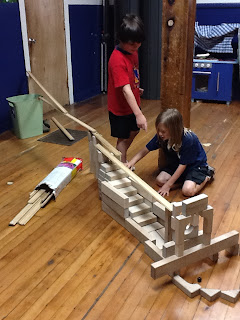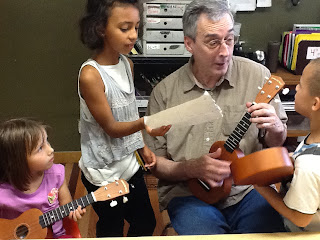 |
| Ramps and marbles - endless fun. |
 |
| Mitch writes chords for a second-grader's song while others practice accompaniment. |
 |
| Just dump the whole bin of duplos on the floor. |
As a public and charter-school teacher I had to struggle and fight to squeeze time for play - both structured and unstructured - into a school day. I worked at schools where core academic subjects were considered to be the most valuable use of time, and sometimes I agreed with that prioritization. But the longer I worked with kids who had a hard time sitting still, struggled to get along with their peers, or couldn't easily improvise new ways to solve problems, the more I felt that play should be an integral part of school.
High-stakes testing tends to squeeze play out. Primary and pre-school kids spend more time learning the fundamentals they need for literacy and math at an earlier age. And I understand the urgency to teach them those skills, because as educators of low-income kids and children of color we realize that kids' success in school may give them a better shot at success in life when the odds are stacked against them. And once kids get to fourth or fifth or sixth grade, we often don't even think about kids'
need for play.
At Amandla I organized an enrichment class called "board games," and I assured my administrators that we were playing educational games like scrabble and set. But secretly in my mind I named this time "free time" and let the kids do pretty much whatever they wanted. Sometimes that was an intellectually stimulating game of scrabble. Sometimes it was thirty minutes of gossip in the corner. Sometimes it was inventing weird fantasy scenarios involving monsters who destroy towers of dominoes. All are necessary for kids development.
Let me say a little bit more about development. I believe that self-directed play helps kids develop imagination, self-conrol, spatial skills, the ability to negotiate conflict, and many other important skills. It is no coincidence that if you go to the elementary school in Winnetka, one of the most affluent suburbs in the nation, you will find kids playing in every classroom.
At the Free School play fills all of the nooks and crannies of unstructured time. And there are many. Time passes here in an unhurried way. It is not uncommon to see a kid who is six years old spend over an hour on a single activity, because each student marches to the beat of their own attention span. Kids rarely express impatience for school to end. When they are bored they get up and go do something else - boredom is not an outside force but rather something they try to solve themselves. The sense of initiative they maintain is in my opinion the single most valuable thing about a free school education.
I am still worried about making sure everyone knows how to read and do math. Maybe that anxiety is a leftover from my previous job, maybe not. I do know that many of my current fourth-graders write some of their numbers backwards; on the other hand they are quick to recognize patterns such as the fact that all multiples of four are even. One of the ways the Free School makes up for the time that kids don't spend in a formal class setting is a ton of informal learning - the low student to teacher ratio means that kids spend far more time each day talking to adults, and that rich environment of conversation gives them a leg up in developing their academic skills. But it remains to be seen whether my new school is doing enough to ensure that every child gets the basic skills they need. I will report back when I gather more data.
For those of you who are reading this who are, in the Karen Lewis parlance, "real" teachers, working in public or charter schools where you have a large number of needy students to contend with, working in play can be a real challenge. I hope you keep at it. You may not have ukeleles but you can still sing. You may not have space for ramps and marbles but you can have a table with blocks sometimes. You may not have endless hours for kids to be kids but I hope you can find a few minutes here and there.













